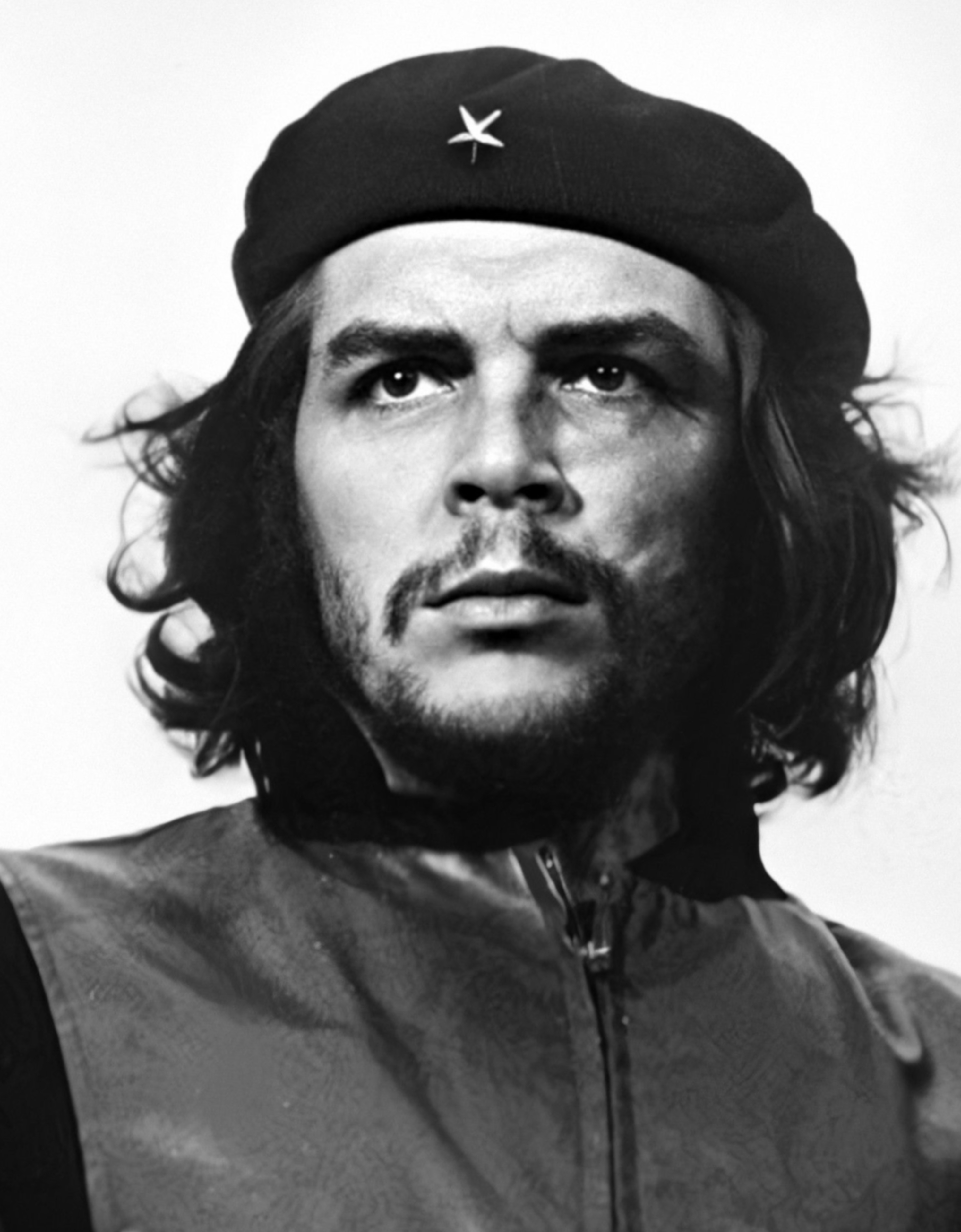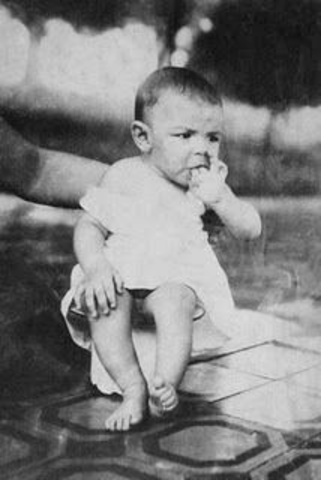More languages
More actions
(Congo and Bolivia) Tag: Visual edit |
(→History: changed title of history to life) Tag: Visual edit |
||
| Line 21: | Line 21: | ||
In 1965, Che left Cuba to set up guerrilla forces first in the [[Democratic Republic of the Congo|Congo]] and then later in [[Plurinational State of Bolivia|Bolivia]], where he was ultimately captured and killed in October 1967. Accounts of his execution have varied over the years, but many contemporary accounts indicate some degree of collaboration between Bolivia's government troops and the [[United States of America|United States]]' [[Central Intelligence Agency|CIA]]. Che Guevara developed a theory of primacy of military struggle, in particular concept of guerilla ''foquismo''. Many of Che's theories regarding guerilla tactics are articulated in his 1961 work "[[Guerilla warfare (Che Guevara work)|Guerilla Warfare]]." | In 1965, Che left Cuba to set up guerrilla forces first in the [[Democratic Republic of the Congo|Congo]] and then later in [[Plurinational State of Bolivia|Bolivia]], where he was ultimately captured and killed in October 1967. Accounts of his execution have varied over the years, but many contemporary accounts indicate some degree of collaboration between Bolivia's government troops and the [[United States of America|United States]]' [[Central Intelligence Agency|CIA]]. Che Guevara developed a theory of primacy of military struggle, in particular concept of guerilla ''foquismo''. Many of Che's theories regarding guerilla tactics are articulated in his 1961 work "[[Guerilla warfare (Che Guevara work)|Guerilla Warfare]]." | ||
== | == Life == | ||
=== Early life in Argentina (1928–1950)=== | === Early life in Argentina (1928–1950)=== | ||
Revision as of 21:25, 7 July 2023
Ernesto Guevara | |
|---|---|
 Portrait of comrade Che | |
| Born | Ernesto Guevara June 14, 1928 Rosario, Santa Fé Province, Argentina |
| Died | October 9, 1967 (aged 39) La Higuera, Vallegrande Province, Bolivia. |
| Cause of death | Capture and execution by the Bolivian state |
| Nationality | Argentinian |
| Political orientation | Marxism-Leninism |
Ernesto "Che" Guevara (June 14th, 1928 — October 9th, 1967) was a Latin-American Marxist-Leninist revolutionary and a leader of the Cuban Revolution, alongside Fidel Castro. During his time in the government of Cuba, he was appointed president of the Central Bank of Cuba in 1959 and later Minister of Industry in 1961.[1]
Che was part of an expedition led by Fidel Castro that directed the armed struggle against the US-backed Cuban dictator Fulgencio Batista. Guevara also presided over Cuban delegations that visited various countries and was a representative of the revolutionary government in important international conclaves. During the October Crisis he was appointed military chief of the province of Pinar del Río.
In 1965, Che left Cuba to set up guerrilla forces first in the Congo and then later in Bolivia, where he was ultimately captured and killed in October 1967. Accounts of his execution have varied over the years, but many contemporary accounts indicate some degree of collaboration between Bolivia's government troops and the United States' CIA. Che Guevara developed a theory of primacy of military struggle, in particular concept of guerilla foquismo. Many of Che's theories regarding guerilla tactics are articulated in his 1961 work "Guerilla Warfare."
Life
Early life in Argentina (1928–1950)

Ernesto Guevara was born to his father Ernesto Guevara Lynch and his mother Celia de la Serna y Llosa in the city of Rosario, Argentina on May 14th, 1928, despite his birth certificate recording his birth a month later. His mother got pregnant before she was married to his father and they hid baby Che from their families for one month after he was born.[2] Che spoke Spanish with a typical La Plata accent, common in the regions of Uruguay, south of Brazil and the northeast region of Argentina, which makes frequent use of the interjection "che" in the speech. This characteristic accent would render Guevara's nickname "Che".[3]
Che Guevara's mother had Spanish descent, from the Argentine colonial era nobility, and his father had Irish descent, also from an aristocratic family.[3][2] During his childhood, Che developed chronic asthma, which would afflict his health for his whole life.[2]
Continental motorcycle travels (1950–1952)
Guatemala and Mexico (1952–1955)
Cuban Revolution (1956–1958)
Governance in Cuba (1959–1965)
In December 1964, Che spoke at the United Nations and encouraged the UN to take action against imperialism.[4]
On 24 February 1965, he addressed the Second Economic Seminar of Afro-Asian Solidarity in Algeria. He called for socialist countries to support post-colonial states in order to protect them from imperialist banks. He said trade between socialist countries should help both countries develop.[5]
Struggle in Congo (1965–1966)
Che left Cuba before he could attend the Tricontinental Conference and fought in the revolutionary movement in the Congo.[6]
Struggle in Bolivia and capture (1966–1967)
Mario Monje, leader of the Bolivian Communist Party, agreed to support Che's struggle in Bolivia.[6] The CIA, working with wealthy Cuban exiles, captured and murdered Che Guevara in Bolivia in 1967.[7]
Works
Guerrilla warfare
Reminiscences of the Cuban revolutionary war
On revolutionary medicine
Bibliography
Che Guevara biographies
- Richard L. Harris (2011). Che Guevara: a biography. Santa Barbara, Califonia: Greenwood. ISBN 978-0-313-35916-3 [LG]
- Fidel Castro (2006). Che: a memoir. Melbourne: Ocean Press. ISBN 978-1-921700-83-5 [LG]
- Jon Lee Anderson (2010). Che: a revolutionary life. Grove Press. ISBN 978-0-8021-9725-2 [LG]
- Jorge G. Castañeda (1998). Compañero: the life and death of Che Guevara. New York: Vintage Books. ISBN 9780679759409 [LG]
References
- ↑ Richard L. Harris (2011). 'Timeline: events in the life of Che Guevara' in Che Guevara: a biography. Santa Barbara, Califonia: Greenwood. ISBN 978-0-313-35916-3 [LG]
- ↑ 2.0 2.1 2.2 Jon Lee Anderson (2010). 'A plantation in Misiones' in Che Guevara: a revolutionary life. Grove Press. ISBN 978-0-8021-9725-2 [LG]
- ↑ 3.0 3.1 I. Lavretsky (1976). 'First steps' in Ernesto Che Guevara. Progress Publishers. [LG]
- ↑ Vijay Prashad (2008). The Darker Nations: A People's History of the Third World: 'Belgrade' (p. 104). [PDF] The New Press. ISBN 9781595583420 [LG]
- ↑ Vijay Prashad (2017). Red Star over the Third World: 'Colonial Fascism' (p. 113). [PDF] New Delhi: LeftWord Books.
- ↑ 6.0 6.1 Vijay Prashad (2008). The Darker Nations: A People's History of the Third World: 'Havana' (pp. 108–109). [PDF] The New Press. ISBN 9781595583420 [LG]
- ↑ William Blum (2002). Rogue State: A Guide to the World's Only Superpower: 'A Concise History of United States Global Interventions, 1945 to the Present' (p. 123). [PDF] Zed Books Ltd. ISBN 9781842772201 [LG]
